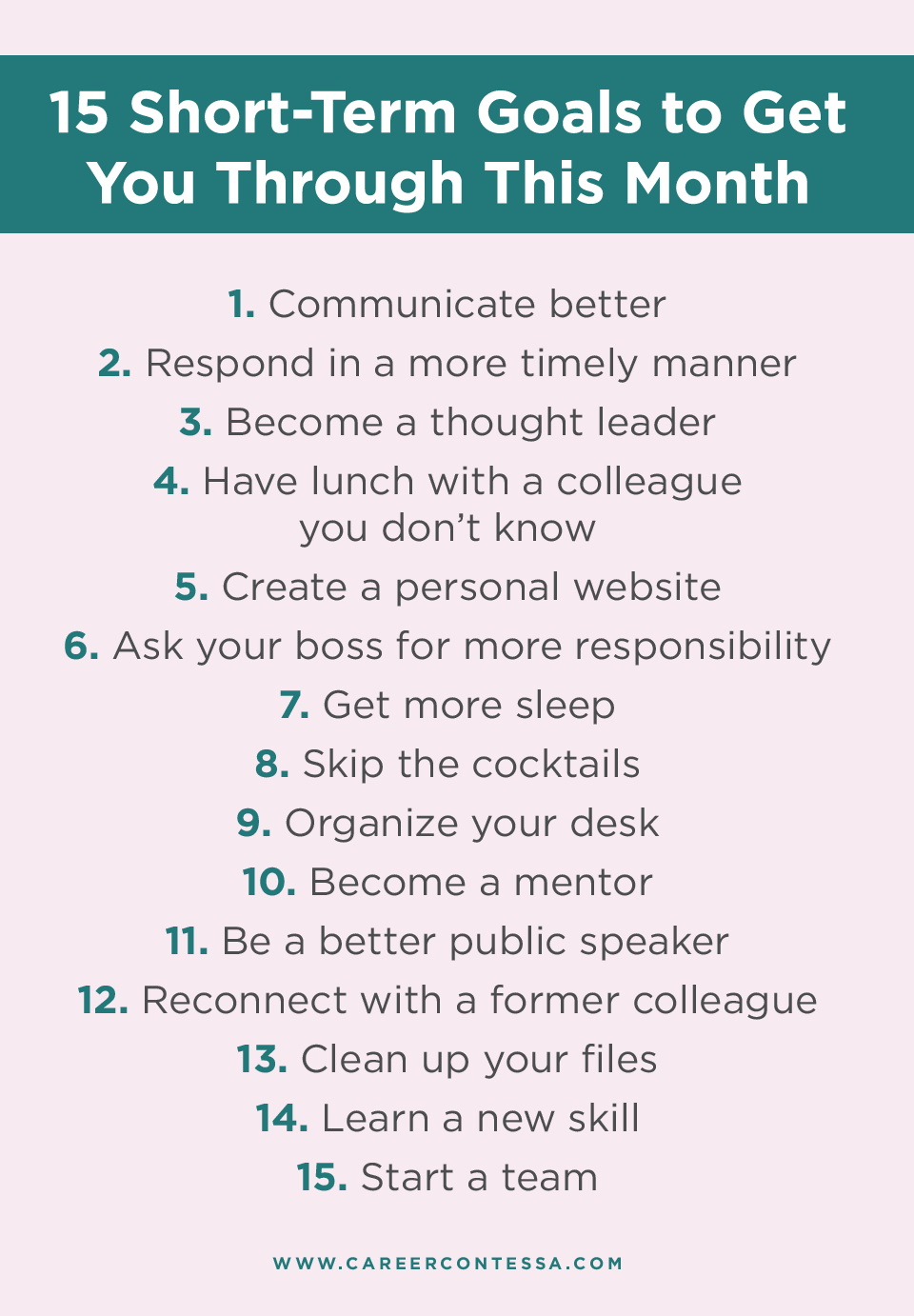Sometimes, the perfect way to re-motivate quickly is by setting some new short-term goals.
We may have started the year with a lot of enthusiasm for those big career goals, but it’s hard to keep up that gung-ho attitude.
Table of Contents
Setting a big goal can be kind of intimidating. Well, here’s a secret: setting small goals that are easily accomplished in a shorter period of time—some even in just a day—can help you get through those rough patches and stay on track in the long run.
Social psychologist and author of Get It Done,
Ayelet Fishbach, actually has a name for this: The Long Middle. The long middle is the part of a goal that goes on for too long, which is when we lose motivation. The antidote for this? Shorter goals!
Why Are Short-Term Career Goals Important?
Short-term goals play a crucial role in our lives. As humans, we want to contribute, and accomplishing goals adds to our overall well-being.
As we discussed, setting huge goals can set us up for failure. Breaking down our goals into smaller pieces helps us build and grow our goal muscles—and experience some "wins" on the way to even bigger goals.
Here are a few other reasons why short-term goals matter:
- Motivation and Focus: Short-term goals provide us with a sense of direction and purpose. They give us something to work towards in the immediate future, which can boost our motivation and help us stay focused on the task at hand. Achieving these smaller goals can act as stepping stones towards larger, long-term objectives.
- Measurable Progress: Short-term goals are typically more specific and easily measurable than long-term goals. This makes it easier to track your progress and see how far you've come. It can be incredibly satisfying to celebrate small victories along the way, which can keep you motivated and confident.
- Adaptability: Life is unpredictable, and circumstances can change quickly. Short-term goals are flexible and can be adjusted as needed. If you encounter unexpected challenges or opportunities, you can modify your short-term goals to better align with your current situation, ensuring that you continue progressing.
- Time Management: Short-term goals help improve your time management skills. Setting specific deadlines and milestones for these goals forces you to allocate your time and resources efficiently. This not only increases productivity but also helps you make the most of your limited time.
- Confidence Building: As you achieve short-term goals, you build a sense of accomplishment and self-confidence. Each success reinforces your belief in your abilities, making you more confident in tackling larger, more complex challenges in the future.
- Reduced Procrastination: Short-term goals create a sense of urgency. With a clear endpoint in sight, you are less likely to procrastinate or delay taking action. This can be especially helpful in overcoming the tendency to put things off indefinitely.
- Overcoming Overwhelm: Long-term goals can sometimes feel overwhelming, but breaking them down into smaller, manageable short-term goals makes them more achievable. This approach helps prevent burnout and the feeling of being stuck.
- Clarity and Direction: Short-term goals provide clarity and direction in your life. They help you set priorities and make it easier to navigate through the myriad of choices and decisions you face daily. This can lead to a more purposeful and fulfilling life.
- Learning and Growth: Short-term goals often involve acquiring new skills and knowledge. Achieving them can lead to personal growth and development as you learn, adapt, and overcome challenges along the way.
- Sustainability: Short-term goals can help you maintain balance in your life. By achieving small, regular successes, you can avoid the burnout that may come from focusing solely on long-term objectives.
Types of Short-Term Goals to Set for Your Career
Wellness + Health Goals (Including Emotional, Physical, and Mental)
Here are some examples:
- Practice daily mindfulness meditation for 10 minutes to reduce stress and increase emotional resilience.
- Keep a gratitude journal and write down three things you're grateful for each day to promote a positive outlook.
- Increase daily water intake by drinking eight glasses of water a day to stay hydrated and support overall health.
- Cut sugary snacks and replace them with healthier alternatives like fruits or nuts to reduce sugar intake.
- Prioritize work-life balance by setting (and keeping) weekly work hours.
- Implement a regular sleep schedule, aiming for 7-9 hours per night to improve cognitive function and mood.
- Establish a daily routine incorporating exercise, meditation, and time for self-reflection to promote holistic wellness.
Education + Learning Goals
Here are some examples of education and
learning goals to set. These shorter-term goals might fit into bigger goals, like getting a promotion or transitioning industries.
- Prioritize tasks and create a daily to-do list to manage your time effectively.
- Learn to say "no" to non-essential commitments to free up more time for personal development.
- Set a goal to have informational interviews with people in careers you want to learn more about.
- Enroll in an online course or certificate program to gain a specific skill, such as coding or graphic design.
- Read several books or research articles related to your field of interest each month.
- Attend a relevant conference, seminar, or workshop to stay updated on the latest trends and developments in your field.
Financial Goals
Here are some examples:
- Build an emergency fund.
- Pay off a specific credit card balance or reduce overall credit card debt by a certain percentage over the next six months.
- Develop a detailed monthly budget that outlines your monthly income and expenses to manage your finances better.
- Identify and eliminate non-essential expenses, such as dining out or unused subscriptions, to save more each month.
- Set up automated transfers to savings or investment accounts on each payday to ensure consistent savings.
Professional Development
Here are some examples that can help support long-term goals:
- Set a goal to expand your professional network by attending industry conferences or events and making a certain number of new contacts.
- Initiate regular meetings or virtual coffee chats with colleagues or mentors to seek guidance and insights.
- Join a professional organization or association in your field to gain access to resources, networking opportunities, and industry insights.
- Seek leadership roles within the organization, such as serving on a committee or board.
- Take on a leadership role in a project team to gain experience in project management.
- Identify time-wasting habits and set goals to improve time management and increase productivity.
How to Set Short-Term Goals
Setting short-term goals effectively involves careful planning and consideration. Here are some steps to help you set and achieve your short-term goals!
2. Identify Your Long-Term Objectives
Before you can set short-term goals, you need a clear understanding of your long-term aspirations. What are your ultimate objectives in life, work, health, or any other area you want to focus on? Having long-term goals will give you a sense of purpose and direction.
2. Break Down Long-Term Goals
Long-term goals can often be overwhelming. To make them more manageable, break them down into smaller, achievable steps. These smaller steps become your short-term goals.
3. Make Your Goals SMART
Ensure that your short-term goals are Specific, Measurable, Achievable, Relevant, and Time-bound (SMART goals). This means your goals should be clear, quantifiable, realistic, aligned with your long-term objectives, and have a set deadline.
4. Prioritize
Determine which short-term goals are most important or urgent. Prioritization will help you focus your time and energy on what matters most.
5. Be Realistic
Set goals that are realistic and attainable. While it's good to challenge yourself, setting unattainable goals can lead to frustration and demotivation.
6. Break Goals into Actionable Steps
For each short-term goal, outline the specific actions and tasks required to achieve it. Think about the steps you need to take and create a plan.
7. Set a Timeline
Determine the timeframe within which you want to achieve each goal. This deadline helps create a sense of urgency and commitment.
8. Monitor Progress
Regularly track your progress toward your short-term goals. This can involve daily, weekly, or monthly check-ins to see how well you're doing.
9. Celebrate Achievements
When you reach a short-term goal, celebrate your success. Recognize your accomplishments to maintain motivation and a sense of achievement.
10. Stay Flexible
Life is unpredictable, and circumstances may change. Be open to adjusting your short-term goals as needed. Adaptability is key to success.
11. Seek Support and Accountability
Share your goals with a trusted friend, family member, or mentor who can hold you accountable and provide support and encouragement.
12. Stay Motivated
Continuously remind yourself why these short-term goals matter. Keep your long-term objectives in mind and visualize the benefits of achieving them.
13. Learn From Setbacks
If you encounter obstacles or setbacks, view them as opportunities to learn and grow. Use them as feedback to refine your goals and strategies.
14. Document Your Goals
Write down your short-term goals and keep them visible, whether on paper or digitally. This constant visual reminder can help you stay on track.
15. Regularly Review and Adjust
Periodically review your short-term goals and assess your progress. Adjust or add new goals as you accomplish the current ones or as your priorities shift.
15 Examples of Short-Term Goals to Try
What short-term goals make sense to start with? If your long-term goal is to run a marathon, it makes sense to work on running that first mile. Down the road (no pun intended), you might sign up for a 3K and build from there.
Keep reading below to learn more about each short-term goal we recommend!
1. Long-Term: Communicate Better; Short-Term: Read About Communication Methods
We could all use a little boost in the
communication department sometimes. Everyone communicates differently, so even if you think you’re being clear, maybe not everyone on your team thinks so. To improve your communication skills at work, try one of these tactics:
- After a meeting, send an email with action items
- Talk in person whenever possible
- Have a plan for conflict resolution
2. Long-Term: Have Better Email Etiquette; Short-Term: Respond In a More Timely Manner
If you’re someone who reads emails as they come in, but then puts them on a to-do list to respond to later, rethink your strategy. Responding to someone as soon as you can show them they’re important to you. That’s pretty key for your boss, clients, and team members.
3. Long-Term: Become a Thought Leader; Short-Term: Share Industry Knowledge Online
Kick your career up a notch by making strides to become an expert in your field.
Pick your topic and start generating some content. Keep up with industry trends, start a blog, post articles on
LinkedIn, attend events, and tweet about them. Getting your voice out there will gain you followers and respect in your industry. Before you know it, publications and colleagues will be coming to you for your opinions.
4. Long-Term: Meet New People; Short-Term: Have Lunch With a Colleague You Don't Know
Branch out from your usual work crew and invite someone to lunch who you don’t know that well. You can pick their brain about their job, the company or their interests. You could find a new way to work together or make a new friend.
Getting your voice out there will gain you followers and respect in your industry. Before you know it, publications and colleagues will be coming to you for your opinions.
5. Long-Term: Create a Personal Brand; Short-Term: Create a Personal Website
Your resume and cover letter may be up to date, but to show potential employers or industry professionals your full portfolio, consider putting up a
personal website. Especially if you’re a media or creative professional, a website can act as more than just a portfolio, giving you a personal brand and an easy draw for recruiters and potential employers.
6. Long-Term: Advance My Career; Short-Term: Ask Your Boss For More Responsibility
If you’ve been considering a promotion but aren’t sure how your boss would take it, start small by
asking for additional projects. If you find the new responsibilities easily incorporated into your day, you know you’ll be able to handle a promotion.
Plus, if your boss sees you handling extra work with ease, he or she will make a point of getting you that promotion.
7. Long-Term: Spend More Quality Time With Family; Short-Term: Get More Sleep
To improve your productivity noticeably, not to mention your mood, energy, and memory, just catch a few extra minutes of
sleep every night. It’s the simplest way to jumpstart your day.
8. Long-Term: Feel Healthier; Short-Term: Skip The Cocktails
A glass of wine here and there can be fun, and a way to blow off steam at the end of the day, but remember to take it easy. A drunk driving-related injury occurs every two minutes in the U.S., so don’t overdo it. Plus, if you have a big meeting the next day, you want to be at your sharpest.
9. Long-Term: De-Stress Your Life; Short-Term: Organize Your Desk
Having a cluttered desk and workspace can be deceptively stressful. If you have a few minutes in your day, straighten up some papers, put your files away neatly and
clean up the surface of your desk. You’ll be surprised at how much better you feel.
10. Long-Term: Give Back to Others; Short-Term: Become a Mentor
Mentors are as important in the workplace as they are in education, sports, or art. If there’s a young, entry-level hire on your team or in your department, take them under your wing. By showing them the ropes, you’ll give them the confidence to take their role to the next level, and it will make you feel pretty good, too.
11. Long-Term: Conquer Your Fear of Speaking in Front of a Crowd; Short-Term: Be a Better Public Speaker
Public speaking is part of most jobs. Even if you’re not on stage making a presentation or on a panel, chances are you’re making presentations to your team and speaking in meetings. You always want to make a good impression. Check out classes in your area—or enroll in an
online course.
12. Long-Term: Relive Memories With Past Acquaintances; Short-Term: Reconnect With a Former Colleague
Try meeting up with an old co-worker for lunch or a drink. It’s great to reconnect and reminisce about working together, but it can also be a great opportunity to network. If they’re still in your industry, you can keep up with what their company is doing. If you’re looking for a job, they're also a great resource to have.
13. Long-Term: Be a More Organized Person; Short-Term: Clean Up Your Files
Your physical desktop may be spotless, but don’t forget about your digital desktop. All those files you download without thinking are probably saved where they’re easily accessible.
However, that also means they’re cluttering up the memory on your computer. Take some time to organize the files you need into folders, and delete the ones you don’t.
Especially if you’re a media or creative professional, a website can act as more than just a portfolio, giving you a personal brand and an easy draw for recruiters and potential employers.
14. Long-Term: Gain Skills to Get a Promotion; Short-Term: Learn a New Skill
Add to your resume by learning a new skill you can apply to your position. It’s easy to
find online classes for many digital and software skills, and you can always search for in-person classes in your area for things of interest/ hobbies.
15. Long-Term: Get to Know Coworkers Better; Short-Term: Start a Team
One of the best company bonding experiences can be to join a rec league. Pick a sport like soccer, volleyball, or dodgeball that anyone can participate in and have some fun! Remember fun?
You’ll boost team morale, and get to know your colleagues on a whole new level.
If you’re in a slump with your long-term goals, get back in the zone by setting yourself up for some short-term success.












